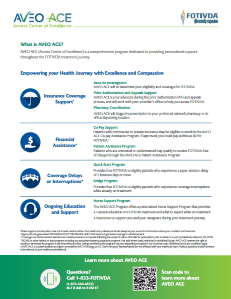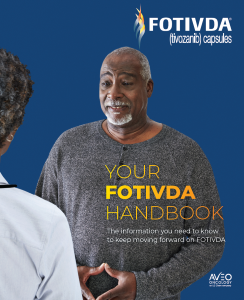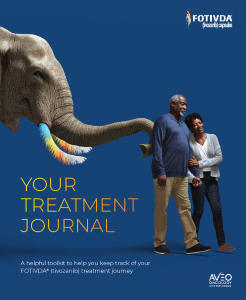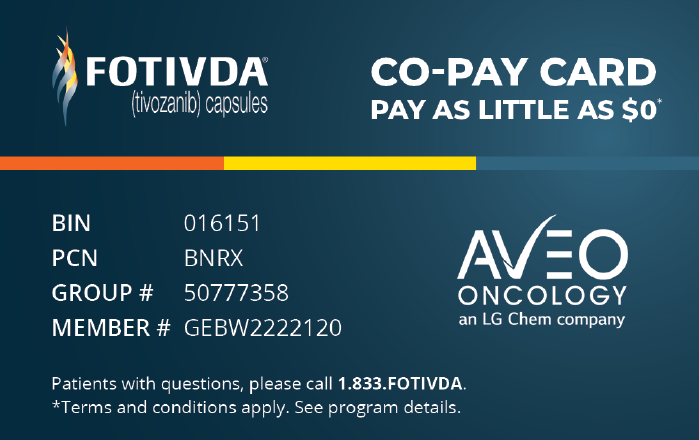

A comprehensive program dedicated to providing personalized support to patients and their loved ones throughout the FOTIVDA treatment journey
AVEO ACE Program Specialists are committed to helping your patients get their prescribed FOTIVDA, no matter their insurance situation.
They can assist by offering information about accessing FOTIVDA and providing resources, including:
- Insurance coverage support to ensure your patient can take their prescribed FOTIVDA
- Identifying appropriate financial assistance options based on your patient’s type of coverage or enroll your patients in the FOTIVDA co-pay program
- Personalized support with AVEO ACE Nurse Navigators and resources to help patients throughout their FOTIVDA journey
How to get started

Call 1-833-FOTIVDA
(1-833-368-4832)
Monday through Friday,
8 AM-8 PM ET.
OR

Enroll
OR

Download and print
the AVEO ACE enrollment form and fax the completed form to 1-888-920-2830.
Insurance coverage support
Regardless of your patients’ insurance or financial circumstances, AVEO ACE program specialists are committed to helping your patients obtain the necessary resources to access their prescribed FOTIVDA.
Let AVEO ACE help you with the following services:
Customized benefits investigations

AVEO ACE can assist with:
- Determining coverage for FOTIVDA
- Navigating any specific prior authorization (PA) requirements
- Verifying your patient’s out-of-pocket costs
- Identifying the appropriate financial assistance options based on your patient’s type of coverage
Appeals support
AVEO ACE can assist you and your patient through the appeals process if coverage is denied:
- Verifying the prior authorization (PA) denial information and determining the insurance plan’s appeal process
- Guiding you through the appeals process, including specific appeal requirements and how to submit the appeal
- Checking for status updates and notifying you frequently until a decision is made
Our Quick Start Program can help your patient start on FOTIVDA during any coverage delays. Ask an AVEO ACE Specialist about how to get your patient started.
Download the FOTIVDA Prior Authorization and Appeals Toolkit for additional information and best practices to navigate appeals.
Download sample letters of appeal.
Pharmacy coordination
Once coverage has been obtained, AVEO ACE will triage the FOTIVDA prescription to your preferred network specialty pharmacy or in-office dispensing location.
- For more information on how to obtain FOTIVDA from one of these specialty pharmacies, simply call the phone numbers listed below or click the links to be directed to their websites

onco360.com
Tel: 1-877-662-6633
Fax:
1-877-662-6355
Hours of Operation:
Monday-Friday, 8 AM-8 PM (ET)
Saturday-Sunday, 9 AM-5:30 PM (ET)

biologicsinc.com
Tel: 1-800-850-4306
Fax: 1-800-823-4506
Hours of Operation:
Monday-Friday, 8 AM-8 PM (ET)


Download the FOTIVDA Distribution Flashcard for more information on the network specialty pharmacies or group purchasing options.
Financial assistance
Co-pay assistance program
Eligible patients may qualify for co-pay assistance and pay as little as $0. See full eligibility requirements.
FOTIVDA Bridge Program
The FOTIVDA Bridge Program allows those who are already on FOTIVDA treatment to receive free FOTIVDA should they experience a treatment interruption.
FOTIVDA Quick Start Program
The AVEO ACE Quick Start Program provides free FOTIVDA to eligible patients who experience a payer decision delay of 5 business days or more. Once you enroll in the AVEO ACE program, your AVEO ACE Program Specialist can see if you are eligible for the Quick Start Program.
Patient Assistance Program
The FOTIVDA Patient Assistance Program provides FOTIVDA at no cost to eligible patients who are uninsured or underinsured. Patients who are eligible for co-pay assistance must:
- Be a resident of the United States or a US territory
- Be uninsured or underinsured
- Meet certain income and financial requirements
Other eligibility requirements and restrictions apply.
DISCLAIMER
AVEO ACE makes no representation or guarantee concerning reimbursement or coverage for any service or item. Information provided through the AVEO ACE program does not constitute medical or legal advice and is not intended to be a substitute for a consultation with a licensed healthcare professional, legal counsel, or applicable third-party payer(s). AVEO ACE reserves the right to modify the program at any time without notice.
Ongoing education and support
Nurse Support Program
The AVEO ACE Nurse Navigators offer personalized support to help patients start and stay on FOTIVDA therapy, including:
- Offering general education to patients taking FOTIVDA, including what to expect while on treatment*
- Answering questions on how to manage potential side effects
- Dosage reminders to help with adherence
- Providing emotional support to promote a sense of well-being
- Educational resources for patients and caregivers
*AVEO ACE Nurse Navigators do not provide medical advice. Representatives are not affiliated with your healthcare team. Patients will be referred to their healthcare provider for any medical questions related to their disease state or treatment plan.
Patient resources
The AVEO ACE Patient Resource Kit is available for your patients starting on FOTIVDA treatment. The kit includes:

AVEO ACE Brochure: This brochure provides an overview of the AVEO ACE service offerings and answers common questions.

FOTIVDA Treatment Handbook: This is a helpful guide that provides information on FOTIVDA treatment, lifestyle tips to manage symptoms, and helpful resources available for patients with RCC.

FOTIVDA Treatment Journal: This resource is a tool where patients can track their treatment schedule, note any symptoms, plan upcoming appointments, and write down questions to discuss during their upcoming visits.
To receive the free AVEO ACE Patient Resource Kit, patients can sign up here.
Explore additional access resources here.
INDICATIONS
FOTIVDA is indicated for the treatment of adult patients with relapsed or refractory advanced renal cell carcinoma (RCC) following two or more prior systemic therapies.
IMPORTANT SAFETY INFORMATION
WARNINGS AND PRECAUTIONS
Hypertension was reported in 45% of patients (22% ≥ Grade 3). Hypertensive crises were reported in 0.8% of patients. Do not initiate FOTIVDA in patients with uncontrolled hypertension. Monitor for hypertension and treat as needed. Reduce the FOTIVDA dose for persistent hypertension not controlled by anti-hypertensive medications. Discontinue FOTIVDA for severe hypertension that cannot be controlled with anti-hypertensive therapy or for hypertensive crisis.
INDICATIONS
FOTIVDA is indicated for the treatment of adult patients with relapsed or refractory advanced renal cell carcinoma (RCC) following two or more prior systemic therapies.
IMPORTANT SAFETY INFORMATION
WARNINGS AND PRECAUTIONS
Hypertension was reported in 45% of patients (22% ≥ Grade 3). Hypertensive crises were reported in 0.8% of patients. Do not initiate FOTIVDA in patients with uncontrolled hypertension. Monitor for hypertension and treat as needed. Reduce the FOTIVDA dose for persistent hypertension not controlled by anti-hypertensive medications. Discontinue FOTIVDA for severe hypertension that cannot be controlled with anti-hypertensive therapy or for hypertensive crisis.
Cardiac failures were reported in 1.6% of patients (1% ≥ Grade 3); 0.6% of events were fatal. Monitor for signs or symptoms of cardiac failure during treatment with FOTIVDA. Manage with dose interruption, dose reduction, or discontinuation.
Cardiac ischemia were reported in 3.2% of patients; 0.4% of events were fatal. Arterial thromboembolic events were reported in 2.0% of patients, including death due to ischemic stroke (0.1%). Closely monitor patients at risk for, or who have a history of these events. Discontinue FOTIVDA in patients who develop severe arterial thromboembolic events, such as myocardial infarction and stroke.
Venous Thrombotic Events (VTE) were reported in 2.4% of patients, including 0.3% fatal events. Closely monitor patients who are at increased risk for these events. Discontinue in patients who develop serious VTEs.
Hemorrhagic Events were reported in 11% of patients; 0.2% of events were fatal. Use FOTIVDA with caution in patients who are at risk for or who have a history of bleeding.
Proteinuria was reported in 8% of patients (2% = Grade 3). Monitor during treatment with FOTIVDA. For moderate to severe proteinuria, reduce the dose or interrupt treatment. Discontinue in patients who develop nephrotic syndrome.
Gastrointestinal (GI) Perforation including fatal cases, has been reported in patients receiving FOTIVDA. Monitor for symptoms of GI perforation or fistula formation periodically throughout treatment with FOTIVDA. Permanently discontinue FOTIVDA in patients who develop severe or life-threatening GI perforation.
Thyroid Dysfunction events were reported in 11% of patients (0.3% ≥ Grade 3). Monitor thyroid function before and during treatment with FOTIVDA.
Wound Healing Complications: Withhold FOTIVDA for at least 24 days prior to elective surgery and do not administer for at least 2 weeks after major surgery and until adequate wound healing is observed.
Reversible Posterior Leukoencephalopathy Syndrome (RPLS) can occur with FOTIVDA. Evaluate for RPLS in patients presenting with seizures, headache, visual disturbances, confusion, or altered mental function. Discontinue if signs or symptoms of RPLS occur.
Embryo-fetal Toxicity: FOTIVDA can cause fetal harm. Advise patients of the potential risk to a fetus, to avoid becoming pregnant and to use contraception during treatment and for one month after the last dose of FOTIVDA. Advise males with female partners of reproductive potential to use effective contraception during treatment and for one month after the last dose of FOTIVDA.
Allergic Reaction to Tartrazine: FOTIVDA 0.89 mg capsule contains FD&C Yellow No. 5 (tartrazine) which may cause allergic-type reactions (including bronchial asthma) in certain susceptible patients.
ADVERSE REACTIONS
Common adverse reactions include fatigue/asthenia, hypertension, diarrhea, decreased appetite, nausea, dysphonia, hypothyroidism, cough, and stomatitis.
Serious adverse reactions include bleeding (3.5%), venous thromboembolism (3.5%), arterial thromboembolism (2.9%), acute kidney injury (2.3%), and hepatobiliary disorders (2.3%).
DRUG INTERACTIONS
Avoid coadministration with strong CYP3A4 inducers.
USE IN SPECIFIC POPULATIONS
Advise women not to breastfeed during treatment and for at least 1 month after the last dose.
The recommended dosage for patients with end-stage renal disease has not been established.
Reduce the FOTIVDA dose for patients with moderate hepatic impairment. The recommended dosage in patients with severe hepatic impairment has not been established.
To report SUSPECTED ADVERSE REACTIONS, contact AVEO Pharmaceuticals, Inc. at 1-833-FOTIVDA (1-833-368-4832) or FDA at 1-800-FDA-1088 or www.fda.gov/medwatch.
Please see full Prescribing Information for FOTIVDA® (tivozanib).

